Aloo sabzi is a Pakistani household classic. It is easy to prepare, filling, and equal part tangy and spicy. The beauty of this dish is that it can be enjoyed for breakfast, lunch or dinner.
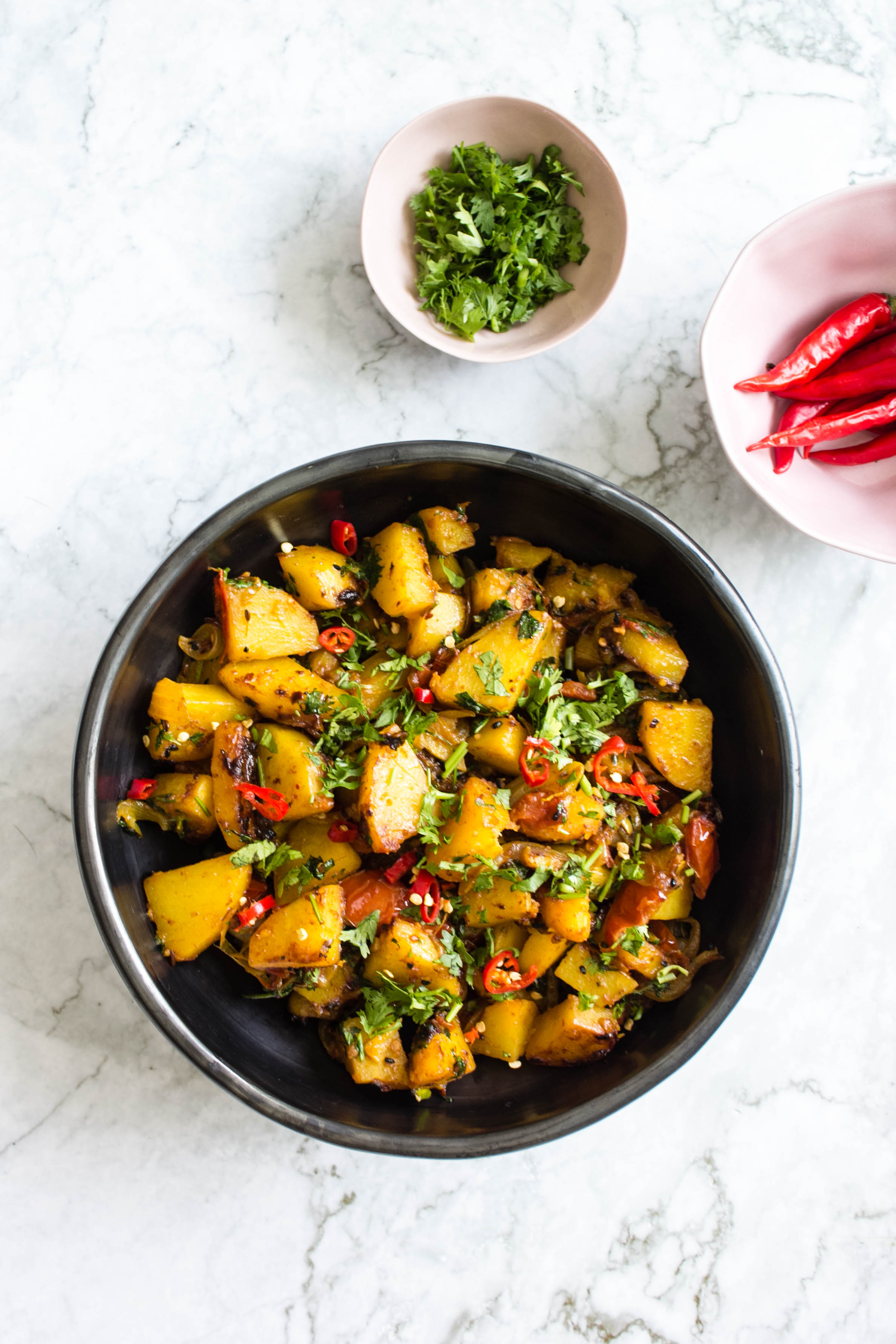
This post was originally published on March 28, 2020 during the outbreak of COVID-19. I have re-published it after recently testing the recipe a few more times.
About This Recipe
I shared this recipe during the start of the COVID-19 outbreak in 2020. Two years later, it's surreal to read this post, and reflect on how the pandemic unfolded. We are very lucky that our family and friends are safe and well, and we remained insulated from the worst of it in Cambodia.
As predicted, this comforting recipe of aloo sabzi carried my husband and me through crazy lockdowns, as well as a move to Philippines a year later. It's the kind of dish I often return to when I feel disoriented or lost. It's simple, filling and of course, delicious. My favorite way to enjoy it is for breakfast with a side of poori and suji ka halwa. I hope you'll give it a try.
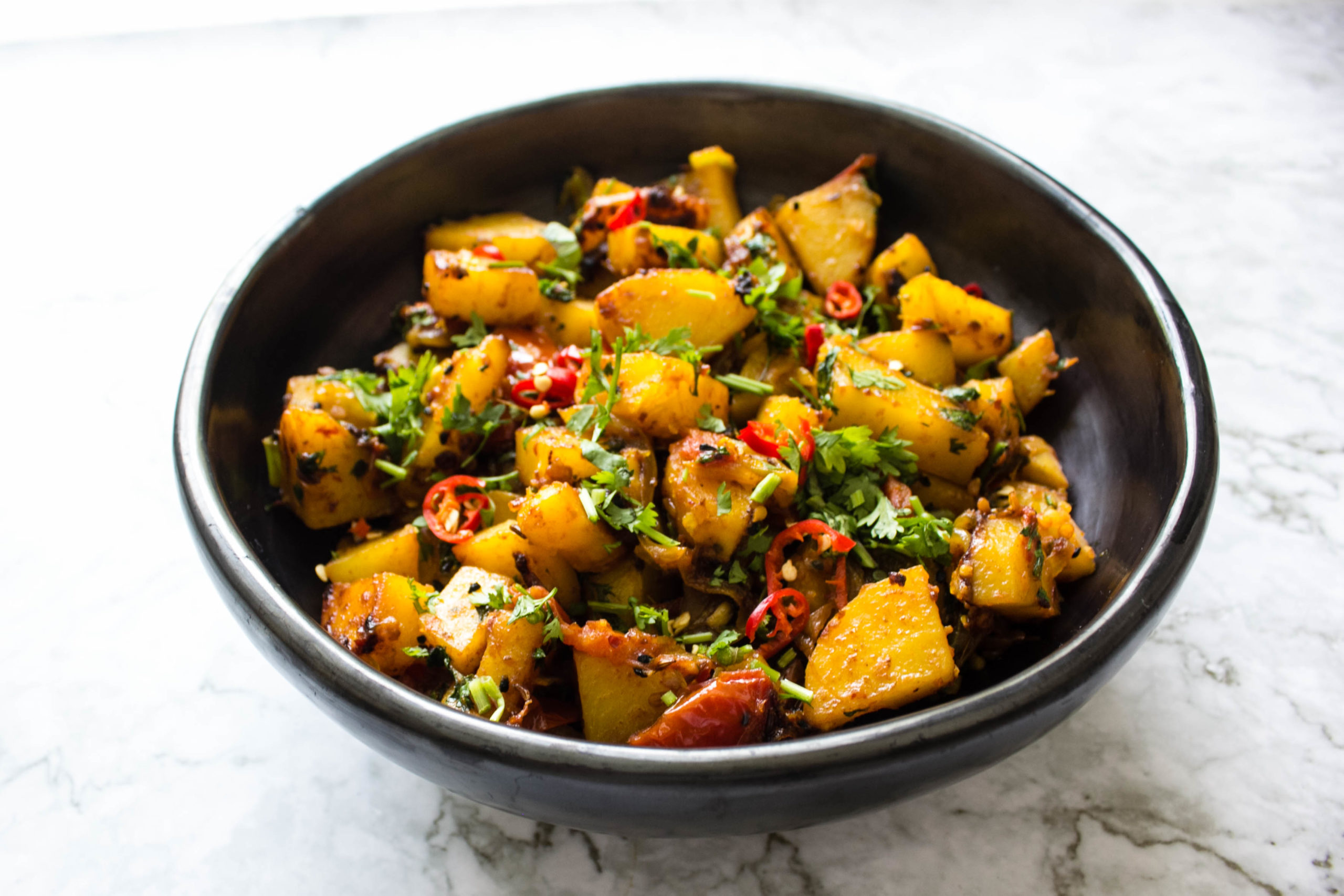
On Resilience
Hello from what will arguably be the strangest time of our life. It feels weird to pop-in here to share an aloo sabzi recipe during an unprecedented crisis but here I am.
I’m writing from Phnom Penh, Cambodia, where the country is definitely on edge amidst the news of rising cases and the possibility of the announcement of a national emergency that will severely limit movement. Saptarshi and I had been waiting for the axe to drop in Cambodia for a while since we heard about the outbreak in China. It’s been an incredibly distressing three months, as we have seen the outbreak travel from country to country, ravaging Iran, Italy, Spain and now New York, home to my younger brother and sister. The scale of the crisis is rapidly growing in Pakistan as well where the government has refused to ban religious gatherings despite moves in neighboring Muslim countries. Given South Asia’s population density, the region is a ticking time bomb.
Earlier in January, while I was in Pakistan, I was having a conversation with my mother about resilience, and what it takes to be a resilient individual, family and unit. International development professionals talk about resilience among households and communities a lot – how do you build or enhance their ability to withstand a crisis. I have been thinking about it as an individual a lot in the last year.
Last spring, I felt my resiliency ‘reserves’ completely depleted. It took for me to leave my job, a ruthless detachment from the problems of my family and friends, a focus on food, and enormous self-reflection and rest to slowly come back to equilibrium. I still haven’t come to peace with my decision to take ‘time off’ but again, I think if I hadn’t taken those steps, I might not have been equipped to handle a crisis of this scale.
An overwhelming majority of individuals do not have the same luxuries as me – a partner with a stable income, no pressing professional pressures and pending bills, and the ability to quarantine in a comfortable environment. We are checking in with our friends and family regularly and so far, everyone is safe. We are incredibly bummed that my sister-in-law and friends have had to postpone their weddings scheduled for May. But we look forward to celebrating them when the cloud of this terrible virus is gone.
Hope you are doing okay too given the circumstances. Be kind to yourself. As my younger and wiser sister recently reminded me, there is no right way to feel right now. Sending you lots of love, and an easy recipe for aloo sabzi that carried me through graduate school and likely through quarantine.
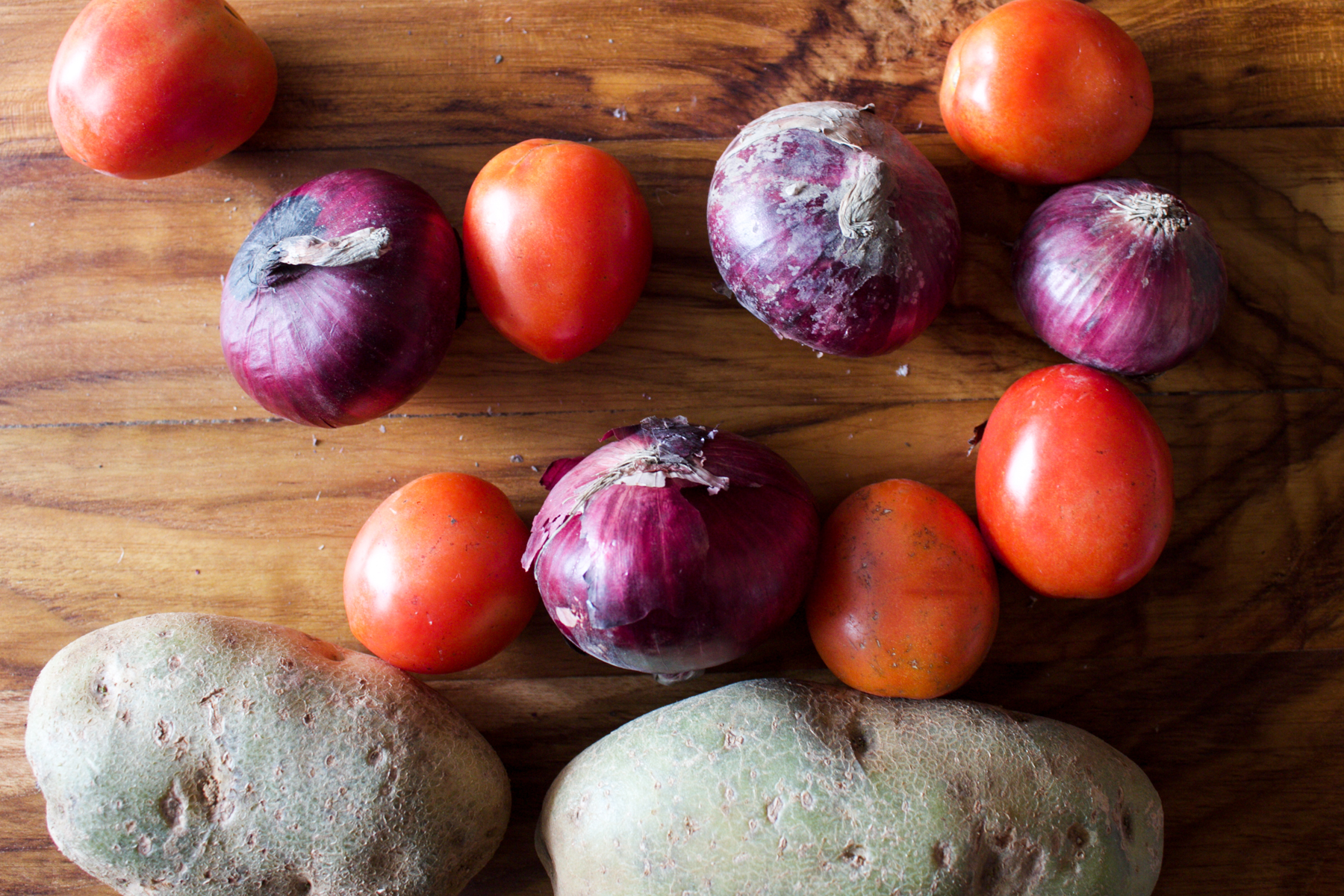
Ingredients
- Neutral oil: I typically use canola oil but avocado, sunflower and vegetable oil works well too.
- Kalonji (nigella seeds): Potatoes and kalonji are a classic match in South Asian cooking. They impart a very slight bitter taste, adding a beautiful layer of flavor to this simple dish. They are available in most Indian or Pakistani grocery stores. If you can't find them, feel free to omit.
- Onions: I prefer to use red onions in this recipe but yellow onions work just as well. I used 4 small ones because they are more commonly available in Southeast Asia.
- Crushed ginger
- Crushed garlic
- Turmeric powder
- Coriander powder: This maybe my favorite ground spice. It has lovely citrus and earthy notes. I would highly recommend getting some instead of trying to substitute it for another spice.
- Red chili powder: My preferred red chili powder is the Kashmiri variety found in South Asian grocery stores but you can substitute it with cayenne red pepper. You will however, have to adjust for heat since cayenne is hotter.
- Salt: I used table salt for this recipe so just adjust for taste depending on the type of salt you are using.
- Roma tomatoes: I used two large roma tomatoes for this recipe but vine tomatoes work well too. Just make sure they are roughly the same weight as the onions.
- Bird's eye chili (optional): I prefer to add a diced bird's eye chili to add some extra heat. Feel free to omit or swap for a locally available variety of chili.
- Potatoes: I normally use russet potatoes but most varieties (yukon gold, yellow or red) work for this recipe. My only recommendation is to make sure that the potatoes are roughly the same weight as the tomatoes and onions combined, so a 2:1:1 ratio. If you have time, you can soak them in water after peeling and dicing them to prevent browning during preparation.
- Cilantro (optional): I love the freshness diced cilantro brings to the dish but feel free to omit if you don't have any on hand.
- Lemon: I don't know why I hadn't been finishing this dish with lemon juice all this time. It's such a game changer. I prefer to use lemon juice but you can substitute it with lime juice if you don't have the former on hand.
How to Make It
Fry kalonji (nigella seeds): Heat heavy bottom pot, and add oil. Once hot, add kalonji (nigella seeds), and fry on medium heat until they begin to pop.
Fry crushed ginger and garlic: Add crushed ginger and garlic, and fry until they begin to stop smelling raw.
Fry ground spices: Lower heat and add all ground spices (turmeric, red chili and coriander powder). Fry for 30 seconds to 1 minute until aromatic. If they begin to stick, add a splash of water to deglaze the pan.
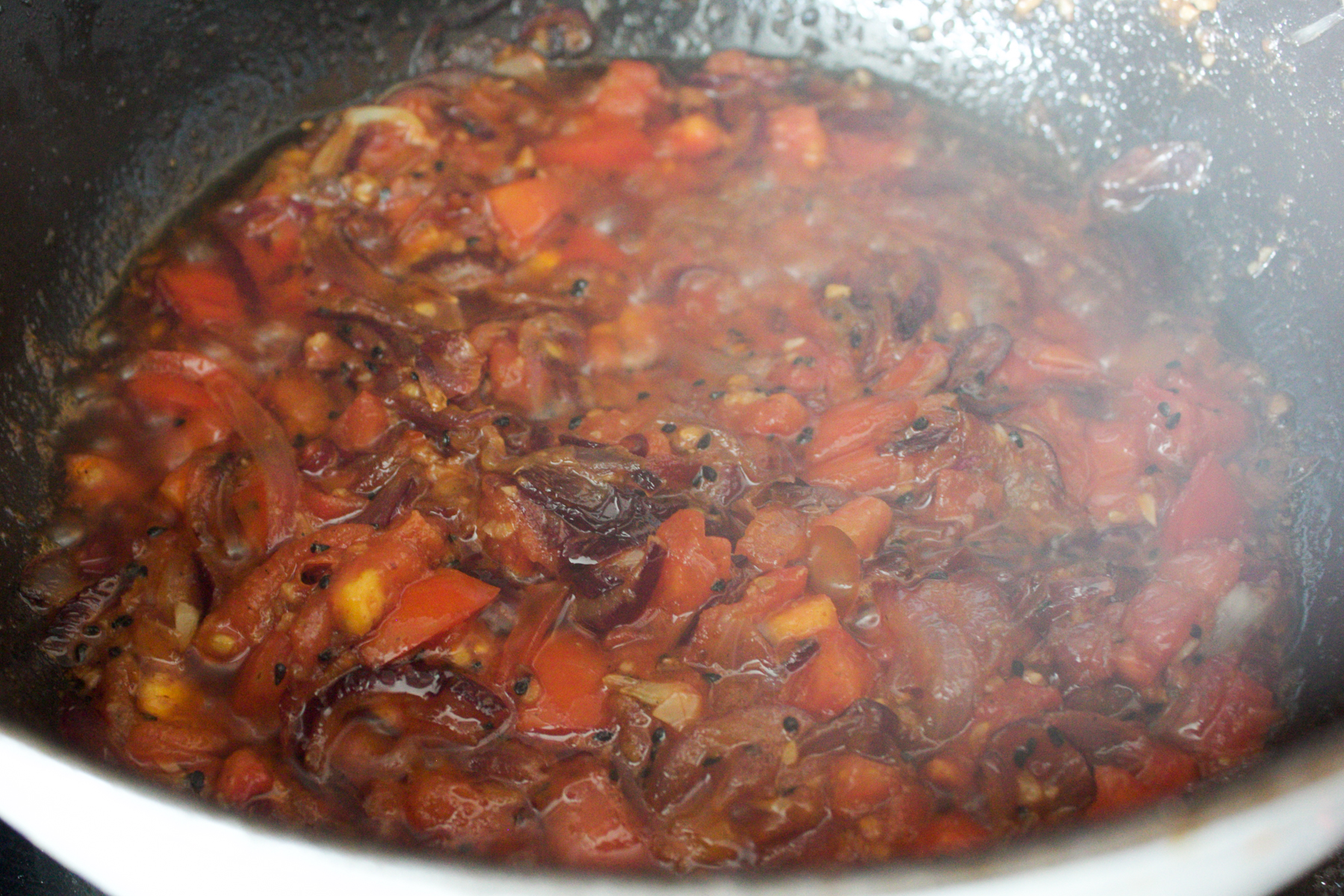
Fry tomatoes: Increase heat to high and add diced chili, tomatoes and salt. Fry until tomatoes begin to soften and break down.
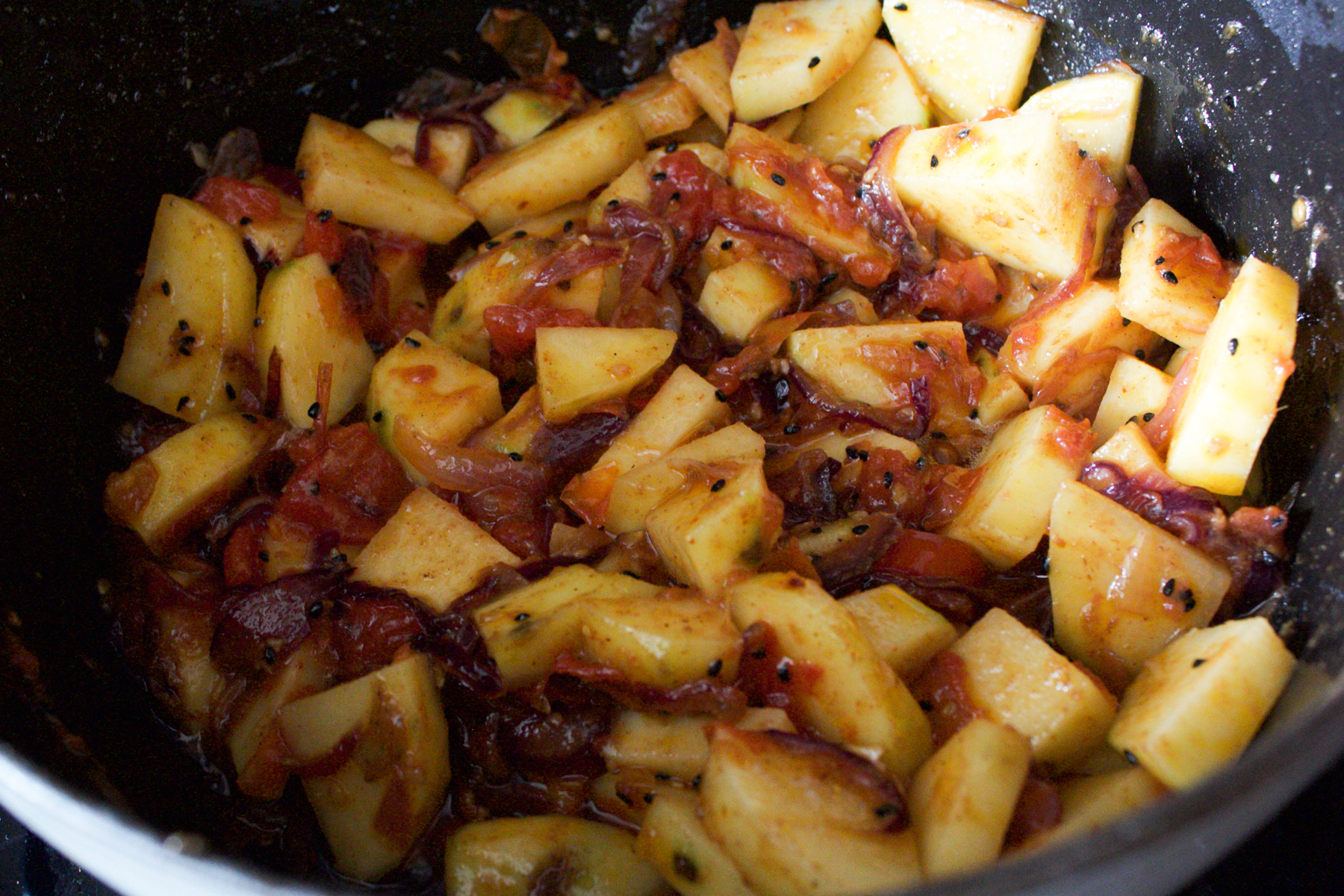
Add potatoes: Stir well to coat in masala.
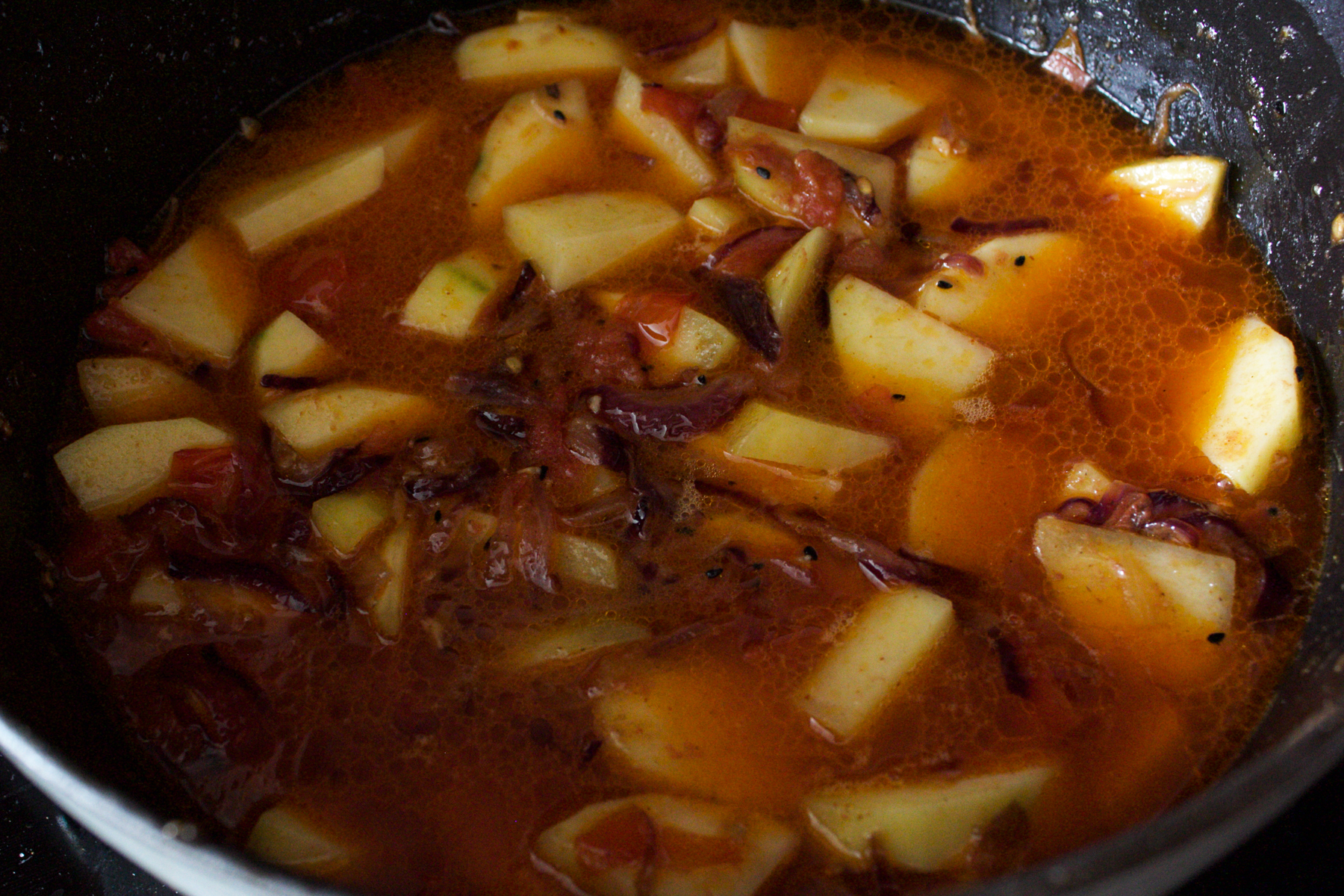
Cook potatoes: Add ½ - 1 cup water - just enough to cover the potatoes - and bring to boil. Lower heat and let the masala simmer in uncovered saucepan until potatoes are done. Check for salt and heat, and adjust as necessary. Turn off heat and gently fold in diced cilantro. Top with lemon juice. Place a tight fitting lid on the saucepan and let the potatoes steam for another 5 minutes.
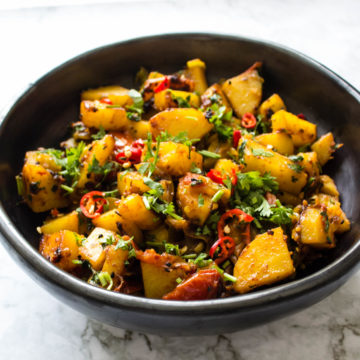
Aloo Sabzi Recipe
Ingredients
- ⅓ cup neutral oil canola/sunflower/vegetable
- ½ teaspoon kalonji (nigella seeds)
- 4 (~9 ounces or 250 grams) small onions thinly sliced in half rings
- 1 teaspoon crushed ginger
- 1 teaspoon crushed garlic
- ½ teaspoon turmeric powder
- 1 teaspoon coriander powder
- 1 teaspoon red chili powder
- 1 teaspoon salt or to taste
- 2 roma tomatoes roughly chopped
- 1 bird's eye chili diced
- 3 (~1 pound or 500 grams) potatoes peeled and diced in ¾ to 1-inch cubes
- ½ cup cilantro finely chopped
- Juice of ½ lemon
Instructions
- Heat oil. Add kalonji (nigella seeds) and fry for a few seconds until they begin to pop.
- Add chopped onion and brown on medium-low heat for 5-7 minutes.
- Add crushed ginger and garlic and fry for 30 seconds or until fragrant.
- Add ground spices (turmeric, red chili and coriander powder) and fry for 30 seconds – 1 minute until aromatic. Splash with water to deglaze the pan if necessary.
- Add chili, tomatoes and salt. Fry on high heat to soften the tomatoes, about 5 minutes.
- Add potatoes and stir well to coat in masala.
- Add ½ - 1 cup water - just enough to cover the potatoes - and bring to boil. Lower heat and let the masala simmer in uncovered saucepan until potatoes are done. Check for salt and spice, and adjust as necessary.
- Turn off heat and gently fold in diced cilantro. Top with lemon juice. Place a tight fitting lid on the saucepan and let the potatoes steam for another 5 minutes.


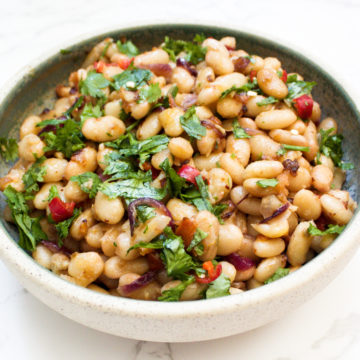
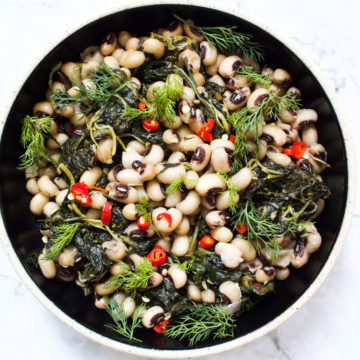
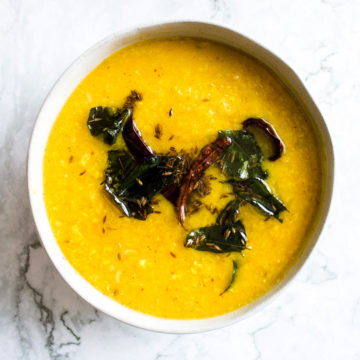
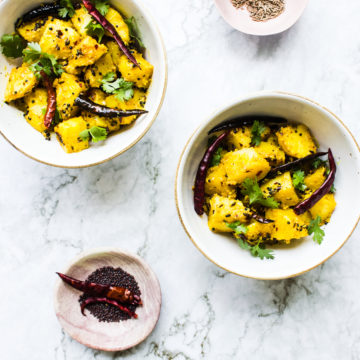
Susan E Hirsch-Ayari
I can't rate the recipe b/c I haven't tried it, but I wanted to tell you how much I appreciate your current work, your amazing writing ability, and the fact that you are so open with your readership. We miss you, Maryam, but it sounds like you are exactly where you need to be doing what you need to do. These ARE strange times and resiliency never loomed larger worldwide than it does today. I'd be curious to know how your mother understood resiliency (you left that part out, lol!) Keep feeding us your thoughts, words and recipes! Sending you good thoughts and many thanks for your inspirational writing.
Samina
My favorite!
Samra
Superb dish and east to follow instructions. A family favourite.
pakistaneats
Thank you so much!